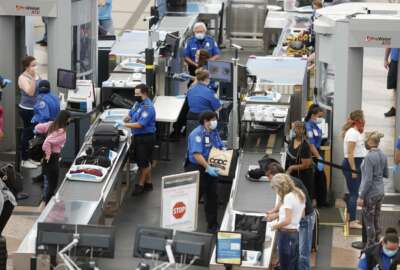The Federal Headlines is a daily compilation of the stories you hear discussed on Federal Drive with Tom Temin.
In today’s Top Federal Headlines, the White House picks a new Solicitor General along with other positions.
- President Donald Trump has made some key appointments to his administration. He picked Courtney Simmons Elwood to be the CIA’s general counsel. John Sullivan will serve in the same role for the Defense Department, and former partner of the firm Jones Day and Acting Solicitor General Noel Francisco is tapped to take on the role permanently.
- The Treasury Department will have to take extraordinary steps, including tapping into the Thrift Savings Plan’s G Fund, to keep the government from defaulting on its debt on or about March 16. The Congressional Budget Office issued a projection on how much money the government can borrow until it reaches its $19.1 trillion limit. CBO outlined six steps Treasury could take to keep the government from defaulting through November. (Federal News Radio)
- President Donald Trump’s proposed 2018 budget could spell trouble for employees at the Social Security Administration. The American Federation of Government Employees Council 220 said SSA may need to furlough its employees for five days for every 1 percent cut to the agency’s administrative budget. That could mean 40 days, or eight weeks, of furloughs. Trump proposed $54 billion in budget cuts to civilian agencies. (Federal News Radio)
- The CIA has taken the stance it usually does when the agency itself becomes the subject of a news story. Leadership at Langley chose to take the no-comment approach to the WikiLeaks posting of nearly 8,000 CIA documents. The CIA’s website carries no mention of the loss. Documents detail agency software that enables hacking of numerous devices. WikiLeaks claims what it calls Year Zero of Vault 7 exceeds the Edward Snowden NSA theft in 2013.
- The leadership of the House and Senate Veterans Affairs Committees said the VA should extend the enrollment deadline for some veterans who have had trouble applying for health care. A VA coding error may have caused the department to incorrectly stall or reject veterans’ applications in recent years. Leading some to get inaccurate information about the kind of paperwork needed. (Senate Veterans Affairs Committee)
- A New Mexico congresswoman wants to improve federal real property management. Rep. Michelle Lujan Grisham’s (D-N.M.) Federal Property Low Hanging Fruit Act would create pilot programs in the Energy Department, USDA, and the General Services Administration to oversee opportunities for leasing federally-owned properties to the private sector. (Federal News Radio)
- The Senate Armed Services Committee gives the go-ahead for President Trump’s new national security adviser to keep his current military rank. Lt. Gen. H.R. McMaster doesn’t need Senate confirmation to serve as national security adviser — the president can appoint whomever he chooses. But under federal law, the Senate does have to approve all three-and-four star military officers for the specific jobs they’re serving in. Without that, McMaster would have to accept a demotion to major general or retire from the Army. In a closed-door session, the committee voted 23-2 to let him keep the three-star rank. It’s unclear when the full Senate will vote on the matter. (Associated Press)
- Smart bases might be a wave of the future for the Defense Department. Ted Johnson, a defense expert at Deloitte, said the time is ripe to invest in smart technologies like solar panels and autonomous vehicles to service military bases. Military installations have struggled to get the money they need, though — 19 percent of them are in failing condition. (Federal News Radio)
- The Commerce Department is trying to shore up one weak link in its cybersecurity effort. Commerce is taking extra steps to make sure many of the vendor products it uses are not infected with malware. Commerce Acting CIO Rod Turk said the agency initiated a supply chain program reviewing open source information for its most critical systems. He said a team of experts found the available information about a specific piece of hardware or software. Then, if necessary, the team analyzes classified information to decide if the products meet a certain risk threshold.
Copyright
© 2024 Federal News Network. All rights reserved. This website is not intended for users located within the European Economic Area.





